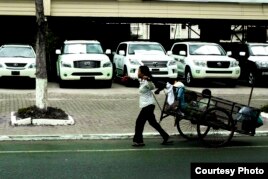23 June, 2015
From VOA Learning English, this is the Economics Report.
A new report says income inequality is hurting the potential for growth around the world. It says the best way to deal with the inequality -- or lack of fairness -- is by helping poor people and the middle class.
The report is based on an International Monetary Fund study. It examined the issue of income inequality: the differences in wealth between the rich and everyone else.

The International Monetary Fund disputes so-called "trickle down" economics from the 1980s. In a recent report, the IMF said income increases for the poor and middle class result in economic growth.
Opinions about income inequality are not hard to find. Many people are concerned about the issue. Kalpana Kochhar is Deputy Director of Strategy, Policy and Review Department at the IMF. On Monday, she said, "The gap between the rich and the poor is at the highest level in decades in advanced countries, and inequality is also rising in major emerging markets."
The new report is called "Causes and Consequences of Income Inequality: A Global Perspective." Ms. Kochhar said, inequality trends have been mixed in emerging markets and developing countries. Some countries are experiencing falling inequality rates, with poor people and the middle class making gains. However, pervasive inequities in education, health care, and finance remain in areas such as Latin America, Middle East and Africa.
The report suggested that policymakers direct their attention on the poor and middle class. That is because they are the major force for economic growth -- or an increase in a country's gross domestic product, or GDP. The GDP is the value of all the finished goods and services produced within the country.
The organizers of the study disputed the main idea of what has been called "trickle down" economic theory. The theory states that economic benefits provided to the wealthy will indirectly help everyone else. The idea is that money and other financial resources will "trickle down" to them.
The IMF study, however, shows the opposite is true. It found that a one percent increase in the earnings of the richest 20 percent of people led to a nearly one percent decrease in GDP growth over a five-year period. An increase in the income share of the poorest 20 percent, the study found, led to more than a one-third percent increase in GDP.
Kalpana Kochhar said this means that directing policy to the poor and middle class is good for growth. She said this means that ending poverty could also improve growth prospects for all. She said that is "a fairly powerful message" for policymakers and researchers around the world.
The report said there is no single program that will succeed in all countries. It said the difference in income levels can have different reasons. The report urged governments to find ways to solve the problem that are specific to their own countries and institutions.
And that's the Economics Report. I'm Mario Ritter.
Xiao Xun reported this story from Washington. Mario Ritter adapted it for VOA Learning English. George Grow was the editor.
_______________________________________________________________
Words in This Story
trend(s) – n. the general direction of change
pervasive – adj. existing throughout something, in every part
benefit(s) – n. good results or effects; payments or other extra things provided
prospects – n. possibilities or opportunities in the future;
specific – adj. well defined; not general